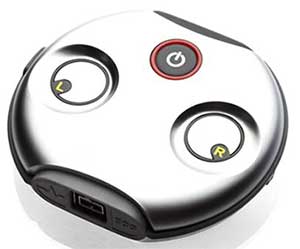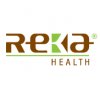- Greater convenience for patients who can record their ECG data anytime anywhere
- Greater efficiency for healthcare professionals who can easily and securely download and analyse data across NUH
- NUHCS leverages upon REKA Health’s Cardiac Rhythm Monitor

Singapore – 6 November 2014 – When 20-year old Su Kaiwen experienced occasional dizziness and heart palpitations, he was worried that he had an underlying heart condition. These symptoms occurred irregularly and infrequently, so a standard electrocardiogram (ECG) test, which monitors heart activity for a short period of time, would not be able to detect the problem or provide healthcare professionals with the right information.
Patients like Kaiwen can now rest assured that their doctor will receive accurate data, with a new ambulatory ECG event monitoring service being offered by the National University Heart Centre Singapore (NUHCS). Launched in early October 2014, this is available across the National University Hospital (NUH).
Patients take the device home with them typically for two weeks and are encouraged to carry it with them all day. They record their heart rhythm as many times as necessary during the two week period, including when they are at rest, exercising and especially when they feel symptoms such as chest pain, heart palpitations or shortness of breath. To record their ECG data, patients simply place both thumbs on the two metal contacts for 30 seconds. This automatically records their ECG data within the device. Data is later downloaded onto a secured NUH server, when the patient returns to the hospital. No manual entry is required, reducing risk of data entry errors. It is simple, quick and fuss-free for both patients and healthcare professionals to use. The cost for this ambulatory ECG event monitoring service is approximately S$90-240 for a two-week period.
In order to implement this monitoring service, NUHCS is leveraging upon REKA Health’s cardiac rhythm monitor. This is a light, portable ECG device that allows patients to practice convenient self-care and home monitoring anytime, anywhere. The medical-grade, single lead device captures heart rhythm and rate on an ECG that records the analytical values PR, RR, QRS and QT. See Annex 1 for background information on arrhythmia and ECG monitors.
“Heart abnormalities typically occur in a sporadic fashion, so a regular ECG in the clinic may not be able to capture the culprit heart rhythm. Sometimes the problem occurs only a few times a week, so even a 24 hour continuous ECG recording may not be able to diagnose the problem. Devices that allow longer term monitoring are hence very useful in patients who experience symptoms of heart arrhythmias infrequently. The key is to have a device that is small, portable and user friendly so that patients are likely to carry it around with them while they go about their daily lives,” said Dr Lim Toon Wei, Senior Consultant, Department of Cardiology, NUHCS.
NUHCS carried out a 1 year pilot trial ending in June 2014, to verify the usability of this device, patients’ reactions to it and how data from the device would integrate with NUH’s existing information technology infrastructure. During the pilot, over 100 cardiac patients tested the device and generally found it easy and convenient to use. Most patients are like Kaiwen, who was reassured that he had no serious cardiac problems. However, occasionally, the monitoring could pick up an acute condition. This allows medical professionals to make the correct diagnosis and prescribe the appropriate treatment.
“We are delighted that NUH is using REKA’s cardiac rhythm monitor to offer this new ECG event monitoring service. This is the first time that a locally-developed cardiac technology is being deployed at a Singapore restructured hospital. Our device has received approval from the Health Sciences Authority (HSA) in Singapore and Therapeutics Goods Administration (TGA) in Australia, as well as fulfills FDA regulatory requirements and CE certification. We are currently distributing it across the U.S., Europe, Australia and Singapore”, said Tan Kae Yuan, Group CEO REKA Health.
- end –
About the National University Health System (NUHS)
The National University Health System (NUHS) groups the National University Hospital (NUH), the NUS Yong Loo Lin School of Medicine, the NUS Faculty of Dentistry and the Saw Swee Hock School of Public Health under a common governance structure to create synergies to advance health by integrating clinical care, research and education.
The enhanced capabilities and capacity will enable the NUHS to deliver better patient care, train future generations of doctors more effectively and bring innovative treatments to patients through groundbreaking research.
For more information about the NUHS:www.nuhs.edu.sg
About the National University Heart Centre, Singapore
The National University Heart Centre, Singapore (NUHCS) brings together the resources, expertise and capabilities in the areas of Cardiology, Cardiothoracic and Vascular Surgery to better meet the needs of the growing number of patients with heart disease. A key centre for the treatment and management of complex cardiovascular diseases, its core clinical programmes include heart failure, structural heart disease, acute coronary syndrome, vascular medicine and therapy, women’s heart health and heart rhythm.
Comprising a team of cardiovascular specialists and experts from a multitude of medical and surgical disciplines, the NUHCS provides a comprehensive and holistic approach to the treatment of patients with heart problems. This approach is backed by cutting edge knowledge and information gathered by the Cardiovascular Research Institute (CVRI).
The CVRI focuses on developing niche research work in creating new knowledge in support of NUHCS’ core clinical programmes by working in close collaboration with both local and international renowned research institutes such as the Agency for Science, Technology and Research (A*STAR) and New Zealand’s Christchurch School of Medicine and Health Sciences.
Partnerships are formed with various medical institutes as the NUHCS is a selected training centre for international physicians. Education and training ensures that our medical professionals are kept abreast of the latest findings, with our specialists also actively involved in conducting workshops and teaching programmes for medical undergraduates.
For more information about the NUHCS: www.nuhcs.com.sg
About REKA Health
REKA Health (REKA) is a leading digital cardiovascular monitoring solution provider for the healthcare professionals and researchers. REKA has developed an easy-to-use solution that complies with medical regulatory standards. The solution comprises medical grade devices, computer and mobile software, and cloud-based web applications that are seamlessly integrated making it the preferred choice by healthcare professionals for their practices and by pharmaceutical companies for their clinical trials. REKA was founded in 2011, headquartered in Singapore with satellite offices in New Jersey, USA and the Netherlands. Marketing under the REKA® brand, REKA has gained recognition from international practitioner communities and has established its global presence covering Europe, North America and Asia Pacific markets. www.rekahealth.com
Media contacts:
Yvonne Lin
Communications & Development
National University Heart Centre, Singapore (NUHCS)
Tel: (65) 6772 6129, Fax: (65) 6773 1813,
Email: [email protected] | www.nuhcs.com.sg
Chan Yiu Lin (Ms)
Greener Grass Communications (For REKA Health)|
Email: [email protected]
Mobile: (65) 9765-5897
Annex 1 – About ECGs and heart arrhythmia
An ECG is a diagnostic tool to measure the electrical activity of the heart. It is typically used to test for cardiovascular problems, such as heart attacks, heart failure and heart arrhythmias. With conventional ECG machines, electrodes are attached to the patient, to measure the timing and duration of the electrical phase of the heartbeat. For the 12-lead ECG, ten electrodes are attached to the arms, legs and chest, in order to produce 12 electrical views of the heart. The 3-lead and single-lead ECGs provide 3 views or a single view. While these can provide complete details on the heart activity, such as heart rate and rhythm, unlike the 12-lead ECG, they are not able to show which areas within the heart that are weakened or not functioning properly.
Heart arrhythmias occur when the electrical impulses that coordinate the heart beat do not work properly. This can cause the heart to beat too fast, too slow or irregularly. Symptoms of heart arrhythmia include heart palpitations, chest pain, shortness of breath, dizziness, excess sweating or fainting. Some cases of heart arrhythmia do not have any symptoms at all. While some heart arrhythmias are harmless, others can be life-threatening, increasing the risk of developing serious conditions such as heart failure or stroke. As such, patients with heart arrhythmias should seek proper medical diagnosis.

